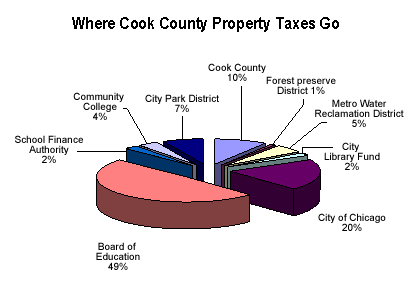| « Chicago's Chief Environment Officer Interviewed | Chicago's Chief Environment Officer Interviewed » |
TIFs Wed Nov 04 2009
How We Can Use TIF Funds
As the issue of tax increment financing (TIF) districts and the non-appropriated "shadow budget" they generate moves into mainstream media coverage, it's important to remember a couple two tree things about TIF funds, the main one being that the money in TIF accounts is not interchangeable with the money that is missing (the deficit) in the city budget.
First, TIFs are ultimately regulated by state statute. [PDF]
Second, TIF funds are property tax funds, and they can't just be spent however. The state statute limits what the money can be spent on. So although the Mayor controls some $1 billion in TIF funds, that money can't just be spent the same as the corporation funds the City spends on most of its budget; by state law it has to be spent inside the TIF district (or an adjacent district) and on statute-defined things.
Third, and related to that, is that the money in TIF funds is not the city's money per se. So if the TIF districts had not existed, the subsequent money raised would not be "freed up" for the city to use; it would return to the following taxing bodies (via the now-defunct NCBG):

You can see, the big loser is the school district (though, as detailed in this Whet Moser/Ben Joravsky post, the state makes up much of this cash) not the city.
The reason this is important to keep in mind is that with an issue as complicated as TIFs, it will become easy for sloganeering to mischaracterize an issue in the public consciousness -- "Why don't you just use some of that TIF money to bail out the CTA?"--and that can ultimately lead to bad policy. My complaint against TIFs has been that it creates a non-legislative budget that the executive can use as a cudgel against legislators. But if those TIF districts did not exist, only 20 percent of their increment would be going to the city.
So while the $500m yearly "shadow budget" Joravsky and Dumke laid out in their brilliant piece in the Reader is real and shocking, we shouldn't start assuming that that money is fungible with the City's budget shortfalls; you can't simply take the money from the TIF funds and pour it into the city's budget.
The other thing to keep in mind is that a lot of the initial money for TIF projects comes from the issuance of bonds "against" the TIF, meaning the bonds are sold up front, and the increment is used to pay down the bonds. So the city often incurs debt in the process of making a TIF. Just sayin'.












AK / November 4, 2009 11:13 AM
You should clarify what you mean when you state that "a lot of the initial money for TIF projects comes from the issuance of bonds 'against' the TIF..." In my limited experience with TIF's, and the way the TIF application reads, bonds are only necessary if any work is to be done in what the city and the TIF application call "the public way", e.g. the renovations on a building involve tearing up the sidewalk in order to access structural elements of the building.
It's also worth noting, along these lines, that TIF funding is retroactive, meaning it gets paid out either after a project is completed or in quarterly or half-year portions as phases of the project are completed. Because of this, anyone that wants TIF funding must pay for the entire project or individual phases of the project up front. They can do this through their own capital, equity, private financing, or bonds; but regardless, TIF doesn't come in until a project is actually completed, or a specific phase is completed.
In any case, and because I'm new at the TIF thing (I'm currently consulting a company on their TIF application, which is a new experience for all of us), I'd like to know what you know about the bond issue. Again, I'm under the impression that bonds are only necessary if any work is to be done "in the public way."